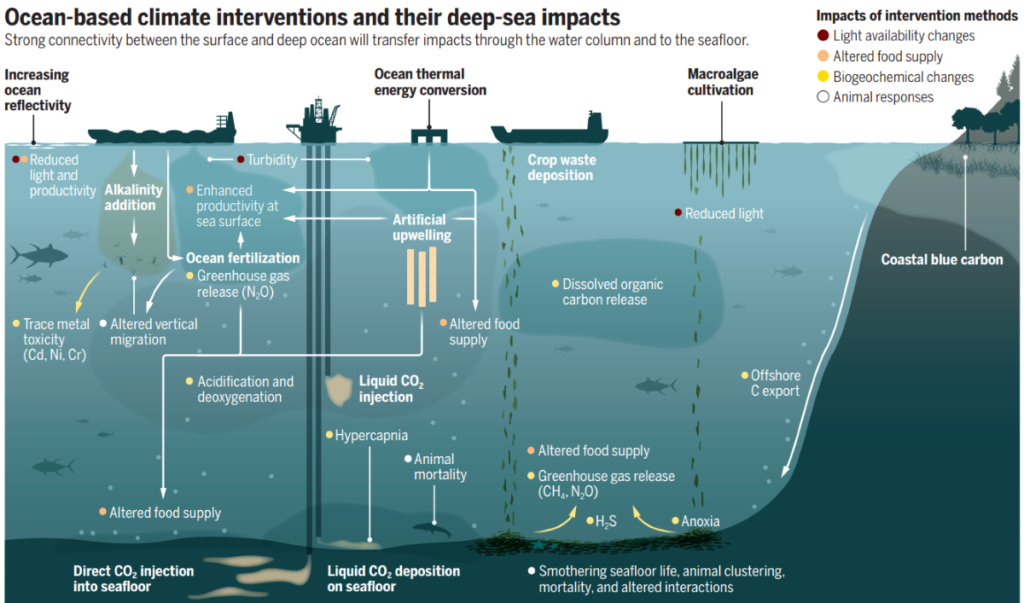Can We Alter the Ocean to Fight Climate Change? Deep-Sea Scientists Urge Caution

This figure from the new paper highlights the potential impacts of OBCIs on deep-ocean environments. Reprinted with permission from Levin et al., Science 379: 6636 (2023)
9 March 2023
FOR IMMEDIATE RELEASE
The world is facing a climate change crisis, and new tools to fight against it are urgently needed. Recently, research groups and startups have been rapidly developing plans for ocean-based climate interventions, or OBCIs, in the open ocean. These interventions would alter the ocean to reduce climate change, using strategies like sending carbon from the air to the deep sea, enhancing the growth of phytoplankton and algae to draw down carbon, or making the ocean’s surface reflect more radiation from the sun. In a new paper published in Science, however, ocean experts warn that these well-meaning strategies could have unintended consequences.
“The spatial scale of these OCBI would likely have to be enormous for the interventions to be effective” said Dr. Nélia Mestre, one of the paper’s authors from the University of Algarve, Portugal. “That may cause equally large impacts on ecosystems, including those in the deep sea.”
The team of experts from eight countries was brought together by the Deep-Ocean Stewardship Initiative (DOSI) under the leadership of professor Lisa Levin from Scripps Institution of Oceanography, UC San Diego. By considering plans that have been proposed so far, they found that OBCIs could pose a serious risk to deep-ocean biodiversity.
That’s a problem: While it’s often overlooked, the deep ocean is the biggest realm on Earth, providing over 90% of the space where life can exist on our planet. The biodiversity of the deep ocean also provides critical services to humans by transporting, storing and sequestering carbon, supplying food and medicines and recycling nutrients—services that we might lose if OBCIs are used without caution. Pumping CO2 directly to the deep ocean, for example, could suffocate the animals that live there.
“Especially given the vastness, vulnerability, comparatively pristine nature, and poor scientific understanding of deep-sea ecosystems, we should be careful about green-lighting these activities that could have irreversible impacts” said Dr. Moriaki Yasuhara, another of the paper’s authors from the University of Hong Kong.
Given the risks of ocean-based climate interventions, the DOSI team is calling for researchers, governing bodies, and industry to work together to carefully assess tradeoffs between mitigating climate change and protecting ocean ecosystems.
“I see ocean-based climate intervention as a rapidly emerging arena that poses significant challenges for deep-ocean ecosystems,” said Professor Levin. “Using these tools effectively will require new science and new, well-coordinated governance strategies before we commit to action.”
—
Media Contact: Brandon Gertz, DOSIcomms@gmail.com
Paper citation: L. Levin et al. “Deep-Sea Impacts of Climate Interventions.” Science 379. 6636 (2023) https://www.science.org/doi/10.1126/science.ade7521
You can find a link to read this new paper for free on the homepage of DOSI’s Climate Change Working Group.
The Deep-Ocean Stewardship Initiative (DOSI) is a global network of experts that seeks to integrate science, technology, policy, law and economics to advise on ecosystem-based management of resource use in the deep ocean and strategies to maintain the integrity of deep-ocean ecosystems within and beyond national jurisdiction.
Further quotes from the authors for media:
“It is without doubt that society needs to consider drastic measures to fight climate change. However, the ecological functions of many deep-sea organisms, their interactions as well as their resilience to change and disturbance, are largely unknown. More research is required to evaluate how the application of OBCI engineering technologies may impact deep-sea ecosystems, which are crucial for Earth’s health.” [Henk-Jan Hoving, GEOMAR, Germany]
“OBCI are deliberate interventions to the marine environment that might be irreversible. The oceans are our planet’s life support, and the deep sea is more than 90% of our oceans. We need action, but not without thorough evaluation of its effects” [Ana Colaço, University of the Azores, Portugal]
“It’s ironic that in order to counteract the continuing rise of atmospheric greenhouse gases and combat climate change, technologies are being developed that may add significant pressures to deep-sea ecosystems that are already facing the effects of a changing climate. Prior to deploying geo-engineered solutions on a large scale, we should at least understand what those pressures will be and, by consequence, what the deep sea may look like in the future.” [Jeroen Ingels, Florida State University, USA]
“We all need urgent measures to contrast climate change, and we assume that the deep ocean, being far from human eyes could be an almost infinite tank for storing the excess of carbon of the atmosphere, but the consequences must be carefully evaluated in relation to the multiple stressors already acting on this huge biome” [Roberto Danovaro, Polytechnic University of Marche, Italy]

